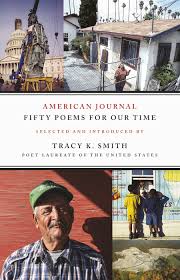
Sometimes chaos seems to have a purpose. Like yesterday morning, when my wife suddenly shouted, “Oh my god, I’m suppose to be at tennis!” and went into a Tasmanian devil whirlwind to outfit herself for the courts where three other ladies were no doubt looking at their watches and wondering about her absence.
Bad to worse: her car was almost out of gas. And mine, being a stick shift, was beyond her driving skills. “Can you drive me?” she asked. Um. Of course.
Ideas for poems come out of chaos. Slowly, you pull strands and fight them into some manner of order. Today I would learn that even something as humble as a book could be born of chaos. After dropping her off, I had an hour to kill. Luckily for me, there was an independent bookstore—that rare beast!—but a mile away.
In the poetry section, I came across American Journal: Fifty Poems for Our Time selected and introduced by Tracy K. Smith (Poet Laureate of the United States). I read the first paragraph of her introduction:
“This is why I love poems: they invite me to sit down and listen to a voice speaking thoughtfully and passionately about what it feels like to be alive. Usually the someone doing the talking—the poem’s speaker—is a person I’d never get the chance to meet were it not for the poem. Because the distance between us is too great. Or because we are too unlike one another to ever feel this at ease face-to-face. Or maybe because the person talking to me never actually existed as anything other than the figment of a poet’s imagination, a character invented for reasons I may not ever know. Even when that someone is the real-life poet speaking of things that have actually happened, there is something different—some new strength, vulnerability, or authority—that the poem fosters. This is why I love poems: they require me to sit still, listen deeply, and imagine putting myself in someone else’s unfamiliar shoes. The world I return to the the poem is over seems fuller and more comprehensible as a result.”
It’s a pretty good reason to love poems, don’t you think? And, in our fraught political times, it’s nice to think of poetry as a place where people can calmly sit and listen to each other via the arbiter called poetry. I especially like the bit about putting ourselves in another’s shoes. Empathy and vision—a new vision—are essential to a poem’s living spirit.
Later in the introduction, Smith continues:
“Poems call upon sounds and silence to operate like music. They invoke vivid sensory images to make abstract feelings like love or anger or doubt feel solid and unmistakable. Like movies, poems slow time down or speed it up; they cross cut from one viewpoint to another as a way of discerning connections between unlikely things; they use line and stanza breaks to create suspense. Even the visual layout of words on the page is a device to help conduct the reader’s movement through the encounter that is the poem. These and other tools help poems call out attention to moments when the ordinary nature of experience changes—when the things we think we know flare into brighter colors, starker contrasts, strange and intoxicating possibilities.”
As the book contained 50 newer voices in the poetry world, I knew it was for me. I brought it to the register and cashed in. And now I’m looking forward to reading and rereading Smith’s choices slowly. In order. Like focusing on one voice at a time in a choir. All because of chaos.
The tennis ladies forgave my wife and said it happens to all of us. I thanked her and said, because of her, this book happened to me. Fate is funny that way.
